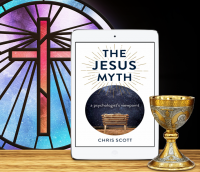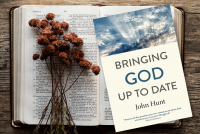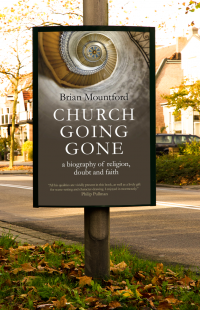
Let’s talk about religion.
From Bringing God Up to Date by John Hunt
John Hunt is to liberal theology what Richard Dawkins is to evolutionary biology...a readable, thoughtful and challenging work. Christian Marketplace
I don’t mean the boring old questions of whether God exists or not, or which religion is the right one, or whether Jesus really came down somehow from heaven to earth to save us from our sins (we have mechanisms in place for dealing with “sin,” called the criminal justice system, with its principles ideally enshrined in constitutions and human rights documents around the world).
I mean – let’s talk about why religion is still important to us, today. After all, it’s been the dominant factor in our culture, determining the nature of our societies, economies, politics, ever since we came down from the trees and starting burying our dead - we’ve been investing in rituals and provisions to help the deceased into the next life for at least a hundred thousand years (and the practice is not even confined to our own species, there’s evidence that Homo neanderthalis and Homo erectus did the same).
But why do we believe in the first place?
The first meaning of religio is “relationship.” The ties that bind us, the bonds we have a duty to uphold, like the “ligaments” that hold our bodies together. There’s a common, universal and ancient thread in religious tradition that takes us back to when “relationship” began. It says that once we were content. We didn’t worry. We lived in what is described in different traditions as the Age of Perfection, the Krita Yuga, the Garden of Eden, the Eternal Springtime, and so on, in innocence. We were at one with nature, because we were nature. We didn’t know good and evil. We couldn’t mess up. We couldn’t even think.
Then at some point in our history, whether 100,000 or 7 million years ago (lowest and highest estimates, depending in part on how many species of “Homo” you include), we became “self-aware.” Armadillos specialize in body armor, cheetahs in speed, this is our own specialty, it’s what we “do.” We began to watch ourselves “living.” Like Adam in the Garden of Eden (Genesis 2:20 – the foundational myth for our current predicament) we began naming things, and talking to each other. So on the one hand we began to enjoy the fruits of self-awareness, of communication, and love; on the other hand we learned the ashes of separation, uncertainty and the fear of death. Ever since then, since the “Fall,” a metaphor for our birth of consciousness, we’ve been trying to put the two together again – the “me” and the “it,” turning “it” into “you,” figuring out how one should relate to the other, groping around the edges of our lives, looking for patterns, for explanations, wondering what’s over the horizon.
Religion began as a response to the dilemmas that self-awareness created. For instance, rather than acting solely in the interests of the species, or the genetic pull of family, individuals could now override their biological programing and act in the interests of the self. But to act solely in the interests of the self is self-destructive for everyone in the longer term. Religions grew to connect us again with the larger whole, replacing our lost instinct. It’s our “big idea” that ties us together; the one that stops the self from getting drunk on its new sense of power; a “larger truth.” If we didn’t have religion, we’d need something close to it. And in the hole left in the twentieth century by the ebbing belief in God we’ve tried a number of different ideas, organizing ourselves around consumption (capitalism), production (communism), country (nationalism) and race (fascism). Maybe the jury is still out, but these ideas don’t seem to have worked.
Maybe the reason they don’t work is because they’re all based on “us,” rather than the “other.” They lack respect for a sense of the “sacred” (for the moment, let’s call it God for short), which is the second meaning of religio. In this view, developing good relationships is not just a personal, moral issue, it’s a universal one, an absolute. It’s the meaning behind everything. Religion is about acknowledging it, bowing to it. Losing that screaming bit in your head that insists “it should be all about me.”
This is more controversial. Why put yourself out for something you can’t see? But the “sacred” has been with us so long it may even be something hardwired into the brain, that makes us human. It’s even what the word “human” means. It probably originates from the Arabic hu, meaning spirit, or God; and the Sanskrit manah, or mind. We think that we are what we have become because we are essentially spiritual beings, minds seeking God, whatever those terms might signify.
Religion is primary. So much so that most deeply religious cultures don’t even have a word for it. For them, to explain why they’re “religious” would be like trying to explain why they breathe. Reading, writing, math, science, these are secondary. They’re what we have to go to school for. They’re relatively new on the human scene. We have a hunger for the meaning that we describe in religion, for the stories that bind us together, that tell us where we came from and where we’re going, that explain how we should relate to each other and the world around us, like we have a hunger for food and relationship. Indeed in most religions these are linked together in sacrifice and ritual meals. Communion, eating the flesh of another to partake of its spirit, is the most ancient and widespread of all religious practices, which most Christians today still follow, either literally or metaphorically.
Christianity is the dominant religion today, with the USA and its allies controlling the vast bulk of the world’s capital, cash and weaponry. It’s a new arrival, one of those religions that could only develop after the invention of writing. Its sacred book, the Bible, is a collection of very disparate texts written by dozens of authors from different cultures, in different languages, even from different faiths, spread over a thousand miles and a thousand years, with another thousand years of debate about which of them should be included (which has never been agreed around all the Churches). It’s simply the most fascinating record in world literature of how our religious understandings change over the millennia. You can still trace in it the lingering remnants of worship of the female spirit, the Mother God, and shamanistic practices which dominated cultures around the world for tens of millennia (and still continue in parts today). You can follow the progress of the (maybe historical) Hebrews as they progressed from polytheism (believing in many gods), through henotheism (one god who was more powerful than the others, eg: Psalm 82:1) to monotheism. You can see their understanding of God change from the amoral shepherd’s God of Abraham, one for pastoralists, who’s carried around with the luggage, to the immoral, barbaric warrior God of Moses, egging on the Hebrews to genocide. From the God who’s carried around in an Ark to one worshipped in a Temple, through to the God of the prophets – where He becomes more of a principle of righteousness and social justice (eg: Amos 5:21-24).
And above all, there’s the moral teaching of perhaps the greatest of the prophets, Jesus, on the kingdom of God. Across the board, the overarching themes are about living for others rather than yourself; treating them as you would like to be treated, even loving your enemy. Living in the here and now. Seeing God in everyone, and in all things, rather than creeds and doctrine. Working for reconciliation, and rejecting violence. Favoring the poor, disabled and ill – how we treat them is a measure of our humanity. Being oblivious to race, gender and sexuality. Refusing to accumulate personal wealth – and if you happen to get it, then giving it away (around half of the parables – the words scholars say he is most likely to have spoken – are on the evils of money and possessions).
The first Christians followed his teaching, practising a form of communism (Acts 2:44-45), but of course that didn’t last. In the decades and subsequent centuries following his death the pagans variously elevated him to the only Son of God, and eventually to being co-equal with God. In one of history’s biggest wealth transfers the Church became the richest organization in the Roman Empire – and still is, in the world today.
It’s a teaching that virtually disappeared early on, as churches became organized, and powerful, and Christianity became the religion of a series of empires, down to the present time, turning the teaching of Jesus back to front. How all that occurred is one of the most intriguing stories in history, shaping the world we know today. To understand how it happened might help us recover and live by at least a little of the original teaching.
But whether you have any kind of faith or not, or whether you’re simply indifferent to it (which covers most people I know – they see it as a distraction or even a hindrance to living a “good” life, in the best sense of the word), it’s still important to understand how and why religion works. Because what people believe influences, even determines, how they behave and who they vote for. From white evangelicals voting for Donald Trump (of those who voted, that’s four out of five, in both the last two US elections – they’re the bedrock of his support) – to the Taliban in Afghanistan, what people around the world believe will determine our future.
READ BRINGING GOD UP TO DATE TODAY!
Religion is an essential part of our humanity. We all follow some form of religion, in the original meaning of the word. But organized religion establishes definitions, boundaries and hierarchies which the founders would be amazed by. This is perhaps more true of Christianity than most other religions, due to the short life of Jesus, his sudden death, the lack of any contemporary records. His teaching about the kingdom of God is great; it could see us through our time on earth. But his followers watered it down and soon lost it altogether. It became a kingdom in heaven for the few, rather than one here and now for everyone.
The Church, or Churches, that resulted became increasingly irrelevant, even a hindrance, to seeing it realized. Many will always find security and truth in the traditions that developed, and good for them. But for those who can't, for those who have given up on religion or never thought it worth considering, the original teachings are worth another look. If we could recover them and live by them, we could change ourselves and the world for the better. We could bring God up to date.
Also from John Hunt
Bringing God Back to Earth
Credible faith in the 21st century.
Our ideas about God need updating. We need more credible ways of believing. Whether you have any religious faith or not, this is worth a look.
"Time and again remarkable...thought provoking in almost every sentence, difficult to put down." Faith and Freedom
"Breath-taking". SoF Network
"Compulsory reading for every budding theologian." The Presbyterian
"Challenges and epiphanies on every page." Nimble Spirit
"John Hunt is to liberal theology what Richard Dawkins is to evolutionary biology." Christian Marketplace
"Enjoyable and exhilarating". Interreligious Insight
"The best modern religious book I have read." Robert Van de Weyer
"Answers all the questions you ever wanted to ask about God and some you never even thought of." Richard Holloway
Church Going Gone with Brian Mountford
What’s different? Christian Alternative is looking for a genuinely liberal and provocative approach to faith, ethics and institutional religion. We want to understand why, despite the Enlightenment and secularization, Christian writers and preachers often cling to pre-modern theological ideas. Why is talk of radical orthodoxy usually more orthodox than radical?
Categories:
0 comments on this article


















